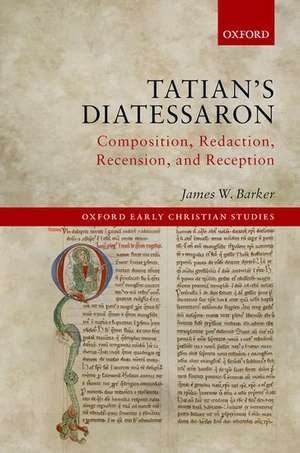Tatian's Diatessaron: Composition, Redaction, Recension, and Reception: Oxford Early Christian Studies
Autor James W. Barkeren Limba Engleză Hardback – 28 oct 2021
Din seria Oxford Early Christian Studies
- 20%
 Preț: 706.02 lei
Preț: 706.02 lei - 17%
 Preț: 582.40 lei
Preț: 582.40 lei - 30%
 Preț: 504.66 lei
Preț: 504.66 lei - 28%
 Preț: 437.72 lei
Preț: 437.72 lei - 17%
 Preț: 582.12 lei
Preț: 582.12 lei - 30%
 Preț: 491.67 lei
Preț: 491.67 lei - 25%
 Preț: 568.80 lei
Preț: 568.80 lei - 25%
 Preț: 627.90 lei
Preț: 627.90 lei - 30%
 Preț: 581.27 lei
Preț: 581.27 lei - 12%
 Preț: 616.72 lei
Preț: 616.72 lei - 27%
 Preț: 573.73 lei
Preț: 573.73 lei - 30%
 Preț: 500.48 lei
Preț: 500.48 lei - 30%
 Preț: 542.84 lei
Preț: 542.84 lei - 30%
 Preț: 528.78 lei
Preț: 528.78 lei - 12%
 Preț: 252.05 lei
Preț: 252.05 lei - 26%
 Preț: 517.83 lei
Preț: 517.83 lei - 26%
 Preț: 598.30 lei
Preț: 598.30 lei - 30%
 Preț: 820.42 lei
Preț: 820.42 lei - 34%
 Preț: 1036.50 lei
Preț: 1036.50 lei - 30%
 Preț: 1107.11 lei
Preț: 1107.11 lei - 22%
 Preț: 361.53 lei
Preț: 361.53 lei - 34%
 Preț: 1327.96 lei
Preț: 1327.96 lei - 9%
 Preț: 255.03 lei
Preț: 255.03 lei - 34%
 Preț: 1123.50 lei
Preț: 1123.50 lei - 34%
 Preț: 845.94 lei
Preț: 845.94 lei - 14%
 Preț: 449.09 lei
Preț: 449.09 lei - 34%
 Preț: 1195.96 lei
Preț: 1195.96 lei - 22%
 Preț: 391.93 lei
Preț: 391.93 lei - 34%
 Preț: 1033.77 lei
Preț: 1033.77 lei - 34%
 Preț: 1255.62 lei
Preț: 1255.62 lei - 34%
 Preț: 819.81 lei
Preț: 819.81 lei - 19%
 Preț: 293.42 lei
Preț: 293.42 lei - 34%
 Preț: 1761.02 lei
Preț: 1761.02 lei - 34%
 Preț: 1725.86 lei
Preț: 1725.86 lei - 30%
 Preț: 947.60 lei
Preț: 947.60 lei - 34%
 Preț: 889.97 lei
Preț: 889.97 lei - 30%
 Preț: 1006.79 lei
Preț: 1006.79 lei - 30%
 Preț: 835.47 lei
Preț: 835.47 lei - 30%
 Preț: 1415.68 lei
Preț: 1415.68 lei - 34%
 Preț: 1199.53 lei
Preț: 1199.53 lei - 34%
 Preț: 756.41 lei
Preț: 756.41 lei - 34%
 Preț: 1108.84 lei
Preț: 1108.84 lei - 34%
 Preț: 872.81 lei
Preț: 872.81 lei - 34%
 Preț: 1446.26 lei
Preț: 1446.26 lei - 28%
 Preț: 338.52 lei
Preț: 338.52 lei - 34%
 Preț: 2061.53 lei
Preț: 2061.53 lei - 31%
 Preț: 1036.54 lei
Preț: 1036.54 lei - 34%
 Preț: 889.97 lei
Preț: 889.97 lei
Preț: 497.45 lei
Preț vechi: 611.76 lei
-19% Nou
Puncte Express: 746
Preț estimativ în valută:
95.20€ • 99.02$ • 78.59£
95.20€ • 99.02$ • 78.59£
Carte disponibilă
Livrare economică 14-20 martie
Preluare comenzi: 021 569.72.76
Specificații
ISBN-13: 9780192844583
ISBN-10: 019284458X
Pagini: 176
Dimensiuni: 165 x 241 x 17 mm
Greutate: 0.43 kg
Ediția:1
Editura: OUP OXFORD
Colecția OUP Oxford
Seria Oxford Early Christian Studies
Locul publicării:Oxford, United Kingdom
ISBN-10: 019284458X
Pagini: 176
Dimensiuni: 165 x 241 x 17 mm
Greutate: 0.43 kg
Ediția:1
Editura: OUP OXFORD
Colecția OUP Oxford
Seria Oxford Early Christian Studies
Locul publicării:Oxford, United Kingdom
Recenzii
Barker has familiarized himself with dozens of manuscript witnesses in Latin, Dutch, German, English, and Italian dialects from microfilms and digital images, many of them unpublished. This is a huge step toward having an informed discussion about extant medieval Western harmony sources and their filiation. Barker is to be praised and applauded for making this effort.
Barker's study takes the field in exactly the direction I have envisioned it should go. In just a matter of years, Barker has produced a tour-de-force that I had imagined it would take a lifetime to complete. All future research on the Diatessaron, including my own, will refer back to this seminal study.
Barker's work is important, especially for specialists in Diatessaronic studies. However, for those new to the discipline it is a highly important work which will make readers aware of the current state of research and the difficult and contested issues that surround this topic. As such it is a fine piece of scholarship that will, no doubt, have enduring value.
This careful and succinct study offers an important contribution to our understanding of how Tatian created his mind-boggling text, while also tracing, sometimes controversially, the twists and turns of its ongoing development and reception.
Barker has produced a tour-de-force that I had imagined it would take a lifetime to complete. All future research on the Diatessaron, including my own, will refer back to this seminal study.
Barker's study takes the field in exactly the direction I have envisioned it should go. In just a matter of years, Barker has produced a tour-de-force that I had imagined it would take a lifetime to complete. All future research on the Diatessaron, including my own, will refer back to this seminal study.
Barker's work is important, especially for specialists in Diatessaronic studies. However, for those new to the discipline it is a highly important work which will make readers aware of the current state of research and the difficult and contested issues that surround this topic. As such it is a fine piece of scholarship that will, no doubt, have enduring value.
This careful and succinct study offers an important contribution to our understanding of how Tatian created his mind-boggling text, while also tracing, sometimes controversially, the twists and turns of its ongoing development and reception.
Barker has produced a tour-de-force that I had imagined it would take a lifetime to complete. All future research on the Diatessaron, including my own, will refer back to this seminal study.
Notă biografică
James W. Barker is Associate Professor of New Testament at Western Kentucky University. In 2014 he received the Paul J. Achtemeier Award for New Testament Scholarship. He is the author of John's Use of Matthew (Fortress Press, 2015).
